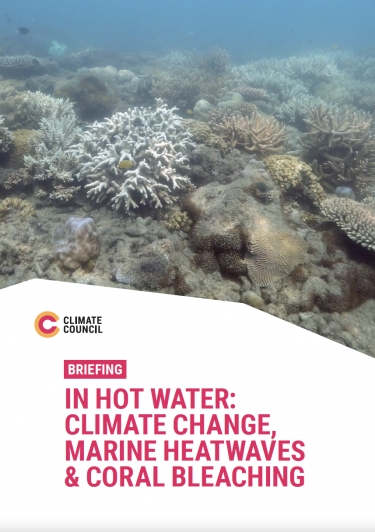The Climate Council briefing, In hot water: Climate change, marine heatwaves and coral bleaching was released on Monday as a UN reef monitoring delegation touches down to assess the condition of the Great Barrier Reef.
The monitoring visit comes ahead of a World Heritage Committee meeting in June to consider listing the Reef as ‘in danger’.
The Climate Council says that the Reef is currently being watched closely by scientists for another possible mass bleaching event, with temperatures up to 3°C higher than average in central parts of the reef - stressing that in recent weeks low-to-moderate bleaching has been recorded across parts of the reef,which has suffered three mass bleachings in just the past six years (2016, 2017, 2020).
|
|
The briefing affirms that last year was the warmest year on record for the world’s oceans.The excess heat absorbed by the ocean in 2021 was equivalent to the energy of seven Hiroshima atomic bombs detonating every second.
Near surface waters off southeastern Australia are warming at nearly four times the global average, leading to changes in the distribution of species, species collapse and a decline in biodiversity.
Climate Councillor, climate scientist and Distinguished Professor of Biology at Macquarie University, Lesley Hughes said: “Under a high emissions scenario, the Reef could face bleaching every year as soon as 2044. This would effectively destroy the Reef and other shallow water reefs worldwide.
“The Great Barrier Reef is dangerously close to another mass bleaching event, which would make it an unprecedented and catastrophic fourth such event in six years. Unless we cut emissions deeply this decade the situation on the reef will only get worse.”
The briefing also reveals that heatwaves are having devastating impacts on Australia’s marine ecosystems including seagrass and kelp forests, and on industries including aquaculture, fisheries and tourism.
Dr Scott Heron, ARC Centre of Excellence for Coral Reef Studies, James Cook University said: “The last eight years have been the warmest years on record, so it isn’t a surprise that we’ve seen increased frequency and severity of marine heatwaves.
“Summertime heatwaves in that period have had severe impacts on the Great Barrier Reef, which not only affect the Reef and the organisms that live there but also the people whose livelihoods rely upon a vibrant reef, such as tourism operators and commercial fishers. It is clear that we need strong action this decade from Australia and from the global community on the primary cause of climate change – fossil fuel emissions.”
Councillor Abigail Noli, Douglas Shire Council, said: "The Douglas Shire has an approximately 80% economic reliance on tourism, so our community depends on a healthy, vibrant reef.
“Queensland can be a global leader in renewable technologies, with some of the best natural resources in the world. Embracing the opportunities of a clean economy will not only protect the Reef, but can deliver huge economic benefits for our region."
Dr Andy Lewis, Executive Director Coral Sea Foundation, said: “Marine heatwaves can cause significant coral mortality and declines in living coral cover.
“Research shows that this decline affects reef fishes, with clear reductions in the diversity and number of fish seen after severe bleaching events. These changes have significance for the overall biodiversity and function of the reef ecosystem, including reef fisheries.”
Ket findings of the Climate Council’s briefing include:
- Climate change is warming the ocean, leading to more frequent and severe marine heatwaves. In just the last six years, marine heatwaves have caused three mass bleaching events on the Reef.
- This summer, the temperature of waters offshore from Australia has been well above average, impacting coral reefs and marine ecosystems.
- After a summer of marine heatwaves, the Reef is again at risk of mass bleaching.
- Under a high emissions scenario, marine heatwaves are projected to become 50 times more frequent by the end of the century and many parts of the ocean could reach a near-permanent marine heatwave state.
- More frequent and severe marine heatwaves also have devastating consequences for other marine ecosystems.
- The near-surface waters off southeastern Australia are warming at nearly four times the global average, leading to changes in distribution of species, species collapse and a decline in biodiversity.
- Every fraction of a degree of warming avoided will be measured in saved ecosystems. Net zero by 2050 is not fast enough.
- Cutting global emissions by at least 50 percent this decade is key to the survival of Australia’s ocean wonders.
The Climate Council stresses that last year, successful political lobbying saw the Reef narrowly dodge being placed on UNESCOs ‘In Danger’ list - and it recommends Australia triple its efforts and take bold measures to reduce its national emissions 75 percent by 2030, and reach net zero by 2035.









































